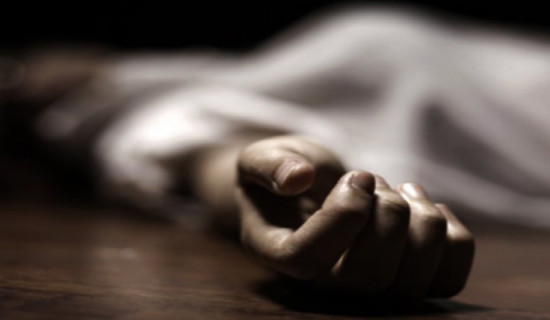- Friday, 21 November 2025
Commit To Immunising Every Child
Every year, October 24th is observed as World Polio Day to raise awareness of the importance of polio vaccination and its role in protecting every child from this devastating disease. The World Health Organisation (WHO) also celebrates this day as a tribute to the efforts of parents, professionals, and volunteers who have contributed to polio eradication in most countries worldwide. However, polio remains endemic in countries like Pakistan and Afghanistan. Nepal was declared polio-free by WHO in 2014.
In the early 20th century, polio was one of the most feared diseases in industrialised nations, paralysing hundreds of thousands of children annually. During the 1950s and 1960s, effective polio vaccines were introduced, which quickly brought the disease under control and eventually eradicated it as a public health threat in these countries. However, in developing nations, it took longer to recognise the disease's prevalence. In the 1970s, surveys revealed that polio was also widespread in these regions. As a result, routine immunisation programmes were introduced globally as part of national vaccination efforts, helping control the disease in many developing countries as well.
Polio eradication initiative
In 1988, the World Health Assembly committed to eradicating polio through the launch of the Global Polio Eradication Initiative (GPEI). This effort was spearheaded by national governments, WHO, Rotary International (RI), the U.S. Cantres for Disease Control and Prevention (CDC), UNICEF, and later joined by the Bill & Melinda Gates Foundation and Gavi, the Vaccine Alliance. Since then, many organisations and individuals worldwide have contributed to this initiative. Wild poliovirus cases have decreased by over 99 per cent since 1988, dropping from an estimated 350,000 cases in more than 125 countries to only 12 reported cases in 2023. Of the three strains of wild poliovirus — types 1, 2, and 3 — type 2 was eradicated in 1999, and type 3 in 2020. As of 2024, wild poliovirus type 1 remains endemic in Pakistan and Afghanistan.
In 2024, 39 cases of polio was reported in Pakistan out of which two fresh cases were reported on October 20th itself in the Sindh Province. Just a day before too four cases were reported as per the Regional Reference Laboratory for Polio Eradication in Islamabad. Out of the 39 cases, 20 were from Baluchistan, 12 from Sindh, five from Khyber Pakhtunkhwa and one each from Punjab and Islamabad. Therefore, it is clear that both rural and urban, remote and central area still have cases of Polio there.
Rotary International, a global Non-governmental Organisation (NGO) founded in the USA, has played a crucial role in this fight. Since its inception, Rotary has supported various social causes, including health, education, and social entrepreneurship. On September 29, 1979, Rotary's efforts led to the administration of the first polio vaccine in Manila, the Philippines, as part of their Health, Hunger, and Humanity (3-H) grant project. This project immunised six million children against polio at a cost of about $760,000. Its success made polio eradication a top priority for Rotary, which launched PolioPlus in 1985. Rotary also became a founding member of the GPEI in 1988, launching the "End Polio" campaign. Since then, RI and its partners have administered oral polio vaccines to over 2.5 billion children worldwide. Rotary District 3292 which covers Nepal and Bhutan is active in these two countries in supporting the governments here in their efforts to eradicate this disease.
Nepal was declared polio-free by WHO in 2014 after maintaining the status for three consecutive years. However, in July 2024, the Ministry of Health and Population (MoHP) in Nepal announced the detection of poliovirus in sewage and river water samples, though no clinical cases were reported. This raised concerns among government and health officials, prompting efforts to prevent the disease's resurgence. Polio is a life-threatening illness caused by the poliovirus, and the vaccine campaign has been reinvigorated to prevent any public health threats. It is highly infectious, primarily transmitted through the faecal-oral route, and can spread via contaminated food and water.
Symptoms typically appear within seven to ten days but can range from four to 35 days. Early symptoms include fever, vomiting, fatigue, headache, stiff neck, and limb pain. In severe cases, polio can cause irreversible paralysis, usually in the lower limbs, and five to ten percent of paralysed patients die from respiratory failure. Nepal’s government has been effective in eradicating polio through the use of oral polio vaccines (OPV), which are widely administered globally. Government health posts and hospitals have continued to create awareness and provide OPV to children under five years of age to ensure no one is left unvaccinated.
Public awareness
Although poliovirus has resurfaced in Kathmandu Valley’s sewage, WHO has assured the public that there is no immediate threat as no human infections have occurred. Nonetheless, the government, in collaboration with UNICEF and WHO, relaunched a campaign to vaccinate all children under five in the Kathmandu Valley, including the municipalities of Kathmandu, Lalitpur, and Bhaktapur. It’s essential to raise public awareness that vaccinated children can excrete the poliovirus through their faeces, posing a risk of transmission to others. Proper disposal of excreta is critical to prevent further spread.
On the occasion of World Polio Day, an awareness campaign will again be reemphasised globally, including in Nepal. In Kathmandu Valley, a cycle rally will be organised by the Ministry of Health, Rotary District 3292, and the Nepal Cyclist Association, with similar programmes held across the country. It is essential to raise awareness and vigilance so that Nepal remains polio-free forever. However, efforts now need to be strengthened in Pakistan and Afghanistan to make sure the endemic there gets eradicated too.
(Sharma is a senior journalist and women's rights advocate. namrata1964@yahoo.com, Twitter handle: @NamrataSharmaP)

















